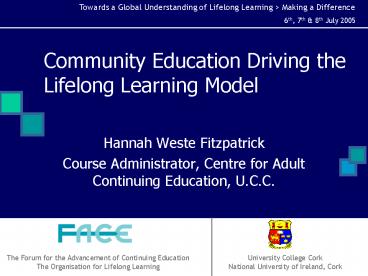Community Education Driving the Lifelong Learning Model - PowerPoint PPT Presentation
1 / 14
Title:
Community Education Driving the Lifelong Learning Model
Description:
Community Education Driving the Lifelong Learning Model. Hannah Weste Fitzpatrick ... Facilitates adults to learn in ways that are meaningful, relevant and develops ... – PowerPoint PPT presentation
Number of Views:95
Avg rating:3.0/5.0
Title: Community Education Driving the Lifelong Learning Model
1
Community Education Driving the Lifelong Learning
Model
- Hannah Weste Fitzpatrick
- Course Administrator, Centre for Adult Continuing
Education, U.C.C.
2
Introduction
- Education is being attributed the key strategic
role in driving economic, social and political
change, what then is the role of community
education and what part does it play in the
overall process of education? This paper will
explore the concepts of community, education and
partnership and will outline the principles of
adult learning as practiced by the Centre for
Adult Continuing Education in its work in
community education.
3
Community as a concept
- God word status, positive connotations
- Lack of critical analysis
- Notions of participation, mutuality, identity,
solidarity and cohesion - Negative aspects of harassment and isolation tend
to be ignored - Concept often high-jacked by politicians
4
Community organisations and Higher level
institutions
- Increased engagement, primarily research based
- Institutions gain access to rich sources of data
- Communities need to gain access to
project-related resources - Mutual benefits
5
Partnerships
- Adult education providers and communities results
of community animators activities - Partnerships challenge accustomed ways of working
and requires new skills - Mutual respect must be demonstrated
6
Social partnerships
- Core value of public policy in Ireland especially
since the 1970s - Tradition of community involvement in the
provision of social services - Currently increased commitment to social change
in combating social exclusion and promoting
equality
7
Community Education
- Diversity in concept and approach
- Designed to support articulated needs and local
skills gaps - Focus on interaction
8
Progression
- Variety of forms, at a personal level, no less
important than more formal routes - Increased community participation and recognition
of existing skills and development of more
structured skill development pathways, i.e.
Centres case study will illustrate later
9
Pedagogy-Androgogy-Heutagogy
- Continuum of educational paradigm from pedagogy
which is teacher-centred, controlled and
directed top-down to androgogy which is
learner centred and validates prior experiences
bottom-up to heutagogy which is self-determined
and chosen learning
10
Centre for Adult Continuing Education Community
Education Case Study
- Operates from the principle of androgogy
- Teaching methods and approaches reflect this form
of learning and assessment - Facilitates adults to learn in ways that are
meaningful, relevant and develops capacities
towards self-directed learning
11
CACE Community Education Programme
- Responds to requests from local development
groups and agencies - Listen to needs, develop responses and negotiate
an appropriate programme - Shared teaching ensures local examples utilised
to increase relevance for participants and to
apply the learning locally
12
CACE Outreach Programmes
- Overcomes geographical, transport and
psychological barriers and facilitates access - Wide range of programmes on offer
- Designated disadvantaged areas covered in both
rural and urban centres - Programme, time and place chosen by participants
- Average 30 outreach centres per year
- Lack of State funding for part-time programmes is
proving a major barrier to participants accessing
funding
13
Conclusion
- Effective community education partnerships reach
agreement around shared objectives, ways of
working, goals and expected outcomes - Flexibility of institutions and a commitment to
the community partners - Mutual trust, openness and transparency
- Clear communication channels, clarity of purpose
and structures which deliver continuity
14
Future
- Increasingly community education participants are
availing of opportunities to progress through to
degree level and beyond - For success it is necessary that a guidance and
support system be in place - The community education principles need to be
incorporated at degree level to support the
lifelong learning model































